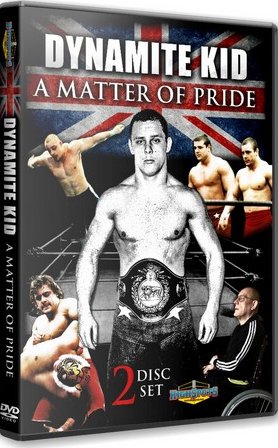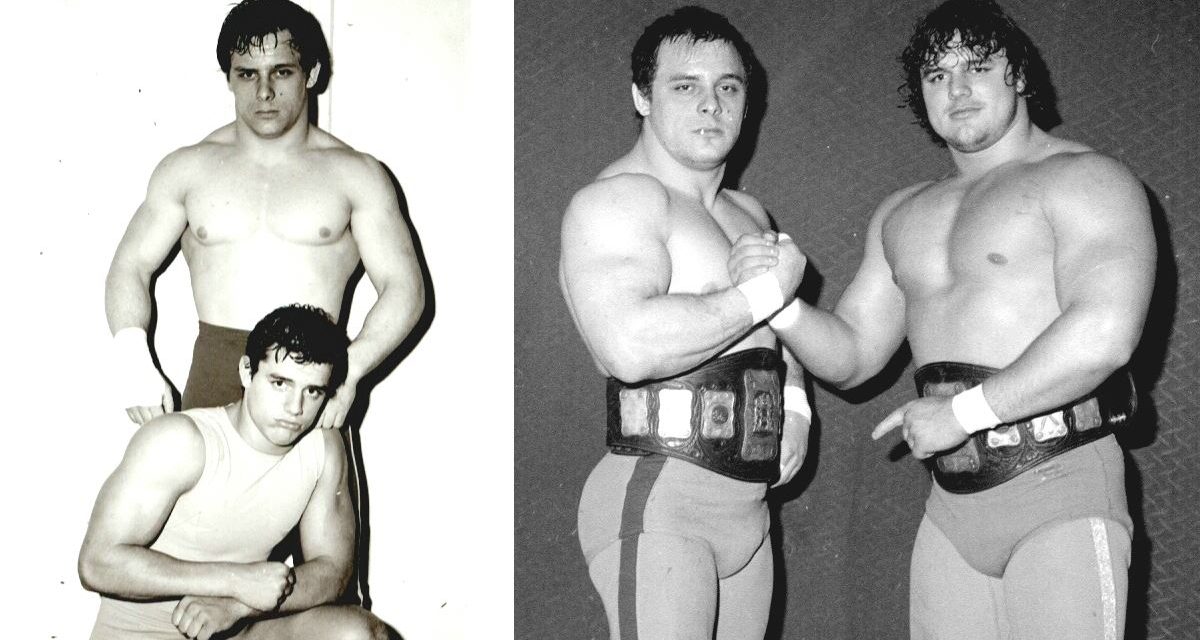Highspots.com’s Dynamite Kid: A Matter of Pride documentary is a very well-constructed story about Tom Billington and what led to the downturn of his career, but at times it’s not easy to watch. The documentary features not only interviews with Billington, but also a who’s who of wrestlers from the 1980s.
The documentary starts off rather slow with some opening credits that are interspersed by scenes of Billington signing various pieces of memorabilia. It quickly moves almost straight into the Stampede Wrestling years and gives only a brief overview of Billington’s time growing up in England, which is a shame as hearing more about those years might have been quite insightful. However, it is mentioned by some of the members of the Hart family later on that the reason Billington abstained from drinking when he first arrived in Canada was a promise he had made to his mother due to the history of alcoholism by the men in his family.

From those early years in Calgary the documentary next moves into Billington’s time in Japan and his revolutionary matches against such opponents as Tiger Mask. Based on the footage provided by New Japan Pro Wrestling and All Japan Pro Wrestling of Dynamite Kid’s matches, it is readily apparent how he was at the height of his wrestling ability at this stage of his career, and that they were unlike anything being done at the time. Unfortunately, the documentary only includes Billington’s matches from his time in Japan due to the high probability of the filmmakers being unable to reach an agreement with WWE to use its footage.
Throughout the documentary the Hart family members and others interviewed talk extensively about Billington’s impact on the business, and how it changed their perspectives about what was possible for a smaller sized man in the professional wrestling industry. There is also a great deal of discussion about how during the Stampede Wrestling days Dynamite Kid began taking steroids because he felt it was necessary for his career. When Billington is asked whether he would do it again he indicates he would and that if a young wrestler was asking for his advice about whether they should take steroids, he simply says he would tell him to do what he wants.
While it is not explicitly stated in the documentary, it seems after this point, Billington went from pulling fun-loving ribs on his fellow wrestlers to more mean spirited ones which would escalate by the time he started working for the World Wrestling Federation. The story about Vince McMahon’s difficulties in getting the British Bulldogs signed is quite funny and one worth watching.
What may come as a surprise to many is that by the time Billington joined the WWF he was already in a great deal of physical pain, yet when he went to the ring he was able to cover it up and still perform at a very high level.
The most riveting tale found in the entire documentary is the one leading up to a confrontation between Billington and Jacques Rougeau Jr. The Quebecer Rougeau is very forthcoming about his feelings and what led to the incident and many others interviewed felt it led to Billington’s eventual downfall. Billington is described by his fellow wrestlers as never being the same after the fight and a short-time later left the WWF to return to Stampede Wrestling. Soon afterwards the British Bulldogs would split as a tag team and Smith returned to the WWF while Billington remained in Calgary for a short time before retiring and moving back to England.
Towards the end, Billington’s book and CNN interview is touched on and the damage both did to his relationship with his fellow wrestlers. As well, Billington’s daughter is interviewed about what the impact was of her father relocating back to England and what her relationship is today with him.
Still, perhaps the most frustrating aspect of the documentary is the fact that while Billington is interviewed he provides short and curt responses that offer few details. It is left to others such as the Hart Family (Ross, Bret, Bruce, Keith and Jim Neidhart) who provide the wealth of information about Billington’s career. The Honky Tonk Man has some particularly good comments. Others interviewed include Terry Taylor, Jimmy Hart, Bad News Allen, Brutus Beefcake, Leo Burke, and many more too numerous to name.
There are points where Dynamite Kid: A Matter Of Pride drags a bit, particularly where there seems to have been an overindulgence of rib stories from so many other wrestlers that they blend into each other; some judicious editing would have been advisable to help the pacing of the film.
The DVD has several extras including additional rib stories, stories about the bulldog Matilda, thoughts on Chris Benoit, comments on Davey Boy Smith, director comments, a tour of Calgary, and interviews with Bruce Hart, Ross Hart and the Honky Tonk Man.
For this particular review I decided to watch the documentary with my father, who is not a wrestling fan, in order to see whether it would appeal to a more general audience. His impressions were that Billington came off as bitter and it left him questioning what kind of person isolates himself in England away from his family. It’s a question that is not really answered and while it’s indicated Billington has a relationship today with his daughter, the documentary has an almost disquieting end to it.
RELATED LINKS

